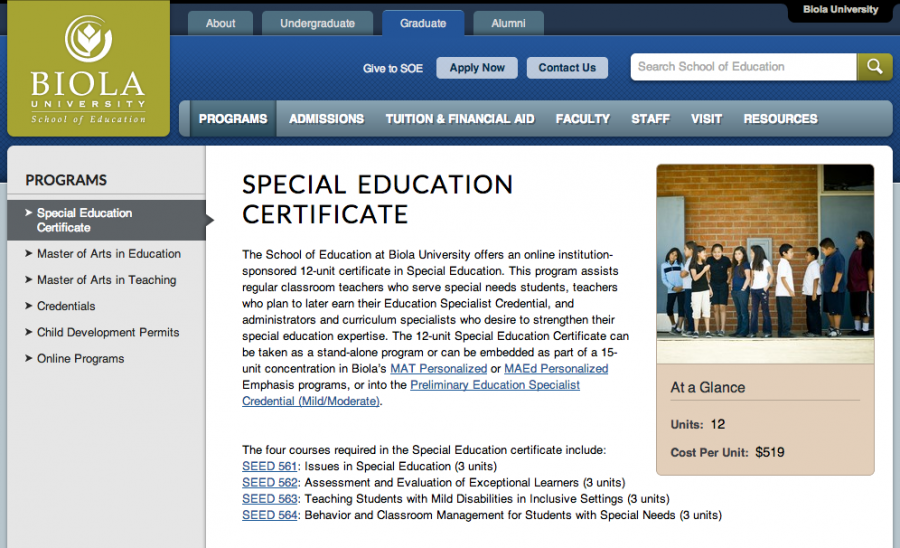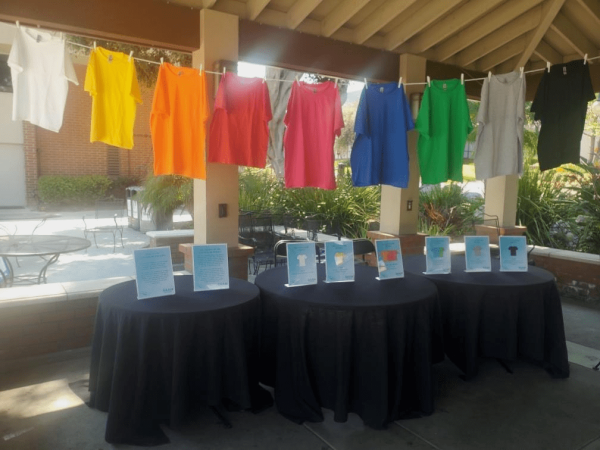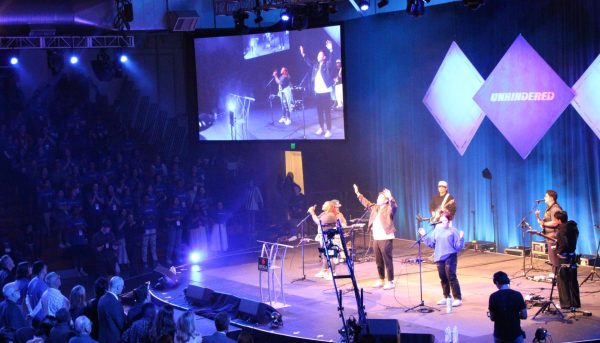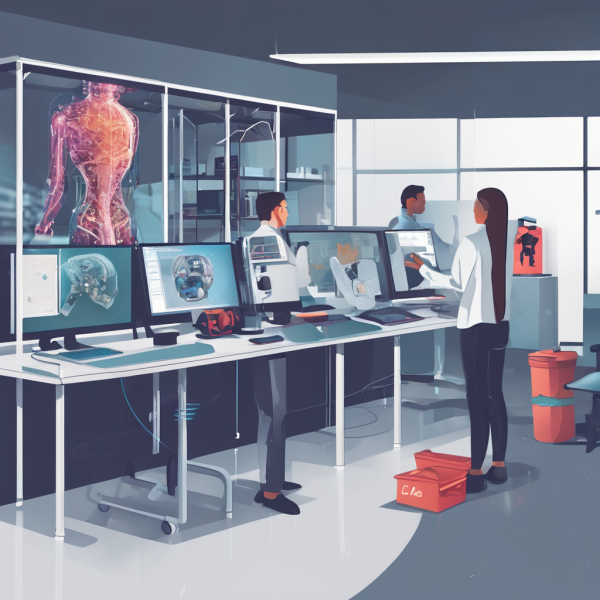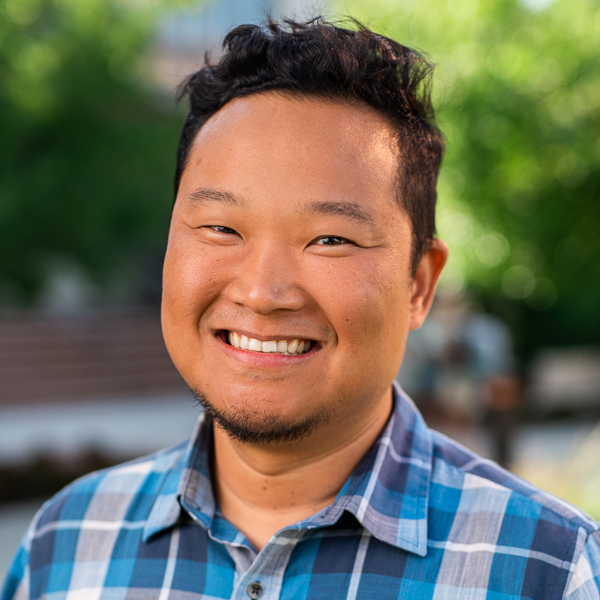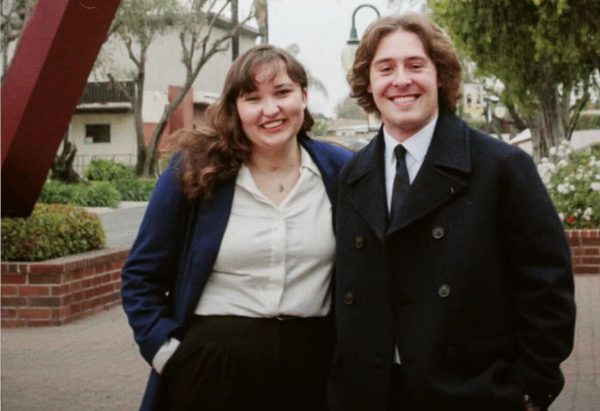Online special education credential program launches
The School of Education now offers a special education credential program, which undergraduate students can begin working towards.
April 20, 2013

The School of Education recently launched a special education online credential program, which undergraduate students can begin working on alongside their bachelors coursework. With a shortage of special education teachers in most schools, the credential will likely reduce the difficulty of post-graduation job searching.
The credential program — titled Preliminary Education Specialist Credential Program (Mild/Moderate) — licenses students to work with special education students with mild to moderate disabilities. This covers a wide range of disabilities and includes the milder part of the autism spectrum, said Tim Stranske, associate professor and assistant dean of the School of Education.
“[With] mild to moderate disabilities, almost all the children will be included in the classroom some of the time, maybe not all of the time, but some of the time … so you’re dealing with issues that are not as extreme,” he explained.
PROGRAM PROVIDES ONLINE COURSEWORK AND HANDS-ON FIELDWORK
Since the program is online, both undergraduate and graduate students, as well as teachers already in the field, will have access to it even if they are not in the area. A couple of years ago, Biola started offering a certificate program that undergraduates could also take as a 12-unit emphasis for elementary education students, Stranske said. Now with the new credential program, students can take as many as 15 units toward the credential in special education, he said. Students who completed this concentration would be set up to finish the special education credential soon after graduation.
“They would only have nine more units of their core course classes and then their student teaching, which is 12 units and they would have their credential, so that could be done in a year after they graduate from Biola,” Stranske said.
Although the coursework for the program can be taken online, students should be aware that it includes in-classroom fieldwork at lab schools that partner with Biola in training students, said June Hetzel, the dean of education. Many nearby schools use a combination of lecture and hands-on experience for these classes, Hetzel added.
However, those who are not in La Mirada but want to take Biola’s online credential program can do the field portion of the work at a school in their area. Hetzel gave an example of a teacher in a rural area who desires to expand their credentials but cannot commute to a college, explaining that they could do all the coursework through Biola and do the hands-on in their own school.
OPENS DOORS IN A TIGHT JOB MARKET
The need for special education teachers in schools — in Southern California and across the country — is great, Hetzel stated. Through regular meetings with various schools in California, Hetzel said that most principals tell her they would be able to hire a special education teacher on the spot. Stranske also expressed the great need for special education teachers.
“A lot of schools, when we talked to the administrators, will say that they could hire special education teachers, and they wouldn’t be hiring any other teachers,” he said.
In a struggling job market, earning this credential creates more job opportunities for aspiring teachers, Hetzel said. Biola’s School of Education contracts with more than 30 school districts, including Los Angeles Unified School District, to place credentialed students in teaching jobs, she said.
OPPORTUNITY TO MINISTER GOD’S LOVE
Stranske’s wife works in the special education field, and Stranske has seen the many opportunities for ministry, both in the classroom and to the parents of special needs students, Stranske said. Helping children, who are often overlooked as difficult, understand that God made them for a purpose can be a part of special education.
“One of the things that she likes to tell her students, as a Christian educator, is that ‘God made you exactly the way he wanted you to be for his glory,’” Stranske explained. “You look at a person like Moses: God said, ‘Who made your mouth? I made it, and … I designed you just exactly how I wanted you.’ And I think that’s the attitude we want to get across to children that maybe learn differently from others.”
In addition to the students, the parents of special needs children often need help understanding their children, Stranske said. This could look like telling parents that their child may need special education or talking with a parent who may blame themselves for their child’s disability, he said.
“The parents need to know that that wasn’t a punishment from God, but a challenge that God gave to them because he thought they were capable of handling that challenge and he will give them his grace and give them the energy and the strength to meet the needs of that child,” Stranske said.
The director of special education at the school of education, Robin LaBarbera, is carrying out this kind of ministry this week in Lebanon. LaBarbera visited Lebanon about two years ago to meet with the Minister of Education and a related committee to help develop policy for special needs students, LaBarbera wrote in an email. She left for Lebanon again Wednesday to present at another conference and celebrate Lebanon’s first annual National Day of Learning Difficulties, she wrote.
“They have very little in the way of help for students with learning difficulties, and they have made great strides since our last trip there. Praise the Lord that the country now recognizes learning difficulties,” LaBarbera wrote.


